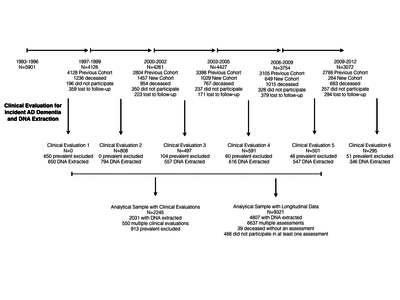Rajan, Kumar B., Mcaninch, Elizabeth A., Wilson, Robert S., Dhana, Anisa, Evans-Lacko, Sara  ORCID: 0000-0003-4691-2630 and Evans, Denis A.
(2024)
Statin initiation and risk of incident Alzheimer disease and cognitive decline in genetically susceptible older adults.
Neurology, 102 (7).
ISSN 1526-632X
ORCID: 0000-0003-4691-2630 and Evans, Denis A.
(2024)
Statin initiation and risk of incident Alzheimer disease and cognitive decline in genetically susceptible older adults.
Neurology, 102 (7).
ISSN 1526-632X
![[img]](http://eprints.lse.ac.uk/122468/1.hassmallThumbnailVersion/Figure4.png)
|
Image (Figure4)
- Accepted Version
Download (40kB) | Preview |
|
|
Text (Statin Initiation and Risk of Incident Alzheimers Disease and Cognitive Decline in Genetically Susceptible Older Adults)
- Accepted Version
Download (432kB) |
||
![[img]](http://eprints.lse.ac.uk/122468/3.hassmallThumbnailVersion/Figure2.png)
|
Image (Figure2)
- Accepted Version
Download (46kB) | Preview |
|
![[img]](http://eprints.lse.ac.uk/122468/4.hassmallThumbnailVersion/Figure1.jpeg)
|
Image (Figure1)
- Accepted Version
Download (199kB) | Preview |
|
![[img]](http://eprints.lse.ac.uk/122468/5.hassmallThumbnailVersion/Figure_3.png)
|
Image (Figure 3)
- Accepted Version
Download (209kB) | Preview |
Abstract
BACKGROUND AND OBJECTIVES: The association of statin initiation with incident Alzheimer disease (AD) dementia and cognitive decline by the APOE ε4 allele is unknown. Our objective was to examine whether the association of statin initiation with incident AD dementia and cognitive decline differs by the APOE ε4 allele. METHODS: This population-based longitudinal cohort study was conducted in 4 urban communities in Chicago, IL, United States, consisting of 4,807 participants. Statin initiation is based on the inspection of medications during home assessments. Clinical diagnosis for incident AD used the NINCDS-ADRDA criteria, and longitudinal measurements of global cognition consisted of episodic memory, perceptual speed, and the Mini-Mental State Examination tests. RESULTS: The study participants had a mean age of 72 years, consisting of 63% female individuals and 61% non-Hispanic Black individuals. During the study period, 1,470 (31%) participants reported statin initiation. In a covariate-adjusted competing risk model, statin initiation was associated with a reduced risk of incident clinical AD [hazard ratio (HR) 0.81 (95% CI 0.70-0.94)] compared with nonusers. This association was statistically significantly lower (p interaction = 0.015) among participants with the APOE ε4 allele [HR 0.60 (95% CI 0.49-0.74)] compared with those without the APOE ε4 allele [HR 0.96 (95% CI 0.82-1.12)]. The annual decline in global cognition (β = 0.021, 95% CI 0.007-0.034) and episodic memory (β = 0.020, 95% CI 0.007-0.033) was also substantially slower among participants with the APOE ε4 allele after statin initiation compared with nonusers. However, the association of statin initiation with cognitive decline was not significant among those without the APOE ε4 allele. DISCUSSION: Our findings suggest that statins might be associated with a lower risk of incident AD among individuals with the APOE ε4 allele. The benefits of statin therapy need further consideration in randomized clinical trials, especially among those with the APOE ε4 allele. CLASSIFICATION OF EVIDENCE: This study provides Class II evidence that among those aged 65 years or older, statin initiation was associated with a reduced risk of Alzheimer disease, especially in the presence of an APOE-e4 allele.
| Item Type: | Article |
|---|---|
| Official URL: | https://www.neurology.org/journal/wnl |
| Additional Information: | © 2024 American Academy of Neurology |
| Divisions: | Care Policy and Evaluation Centre |
| Subjects: | R Medicine > RC Internal medicine |
| Date Deposited: | 21 Mar 2024 15:24 |
| Last Modified: | 01 Jan 2026 02:04 |
| URI: | http://eprints.lse.ac.uk/id/eprint/122468 |
Actions (login required)
 |
View Item |





 Download Statistics
Download Statistics Download Statistics
Download Statistics